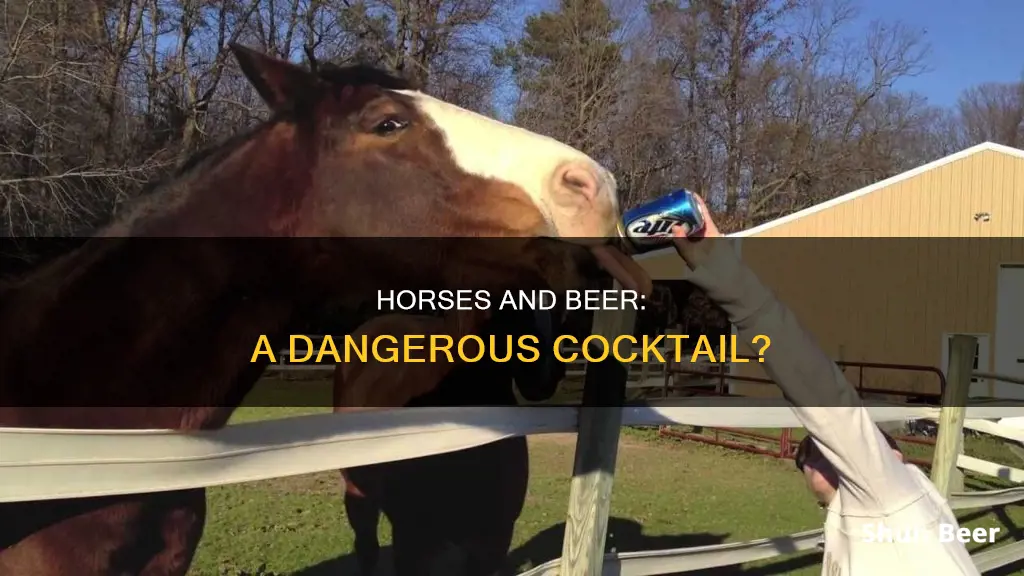
The idea of a horse drinking beer may seem amusing or intriguing to some, but it is a topic that delves into the realms of animal behaviour, physiology, and ethics. While some people argue that the tradition of giving horses beer has potential health benefits, others highlight the risks associated with alcohol consumption in these majestic creatures. So, should horses drink beer? This question sparks curiosity and debates among horse enthusiasts, and it's time to explore the facts and opinions surrounding this intriguing topic.
| Characteristics | Values |
|---|---|
| Potential risks | Digestive issues, neurological impairment, dehydration, liver damage, behavioural changes |
| Reasons owners give beer to horses | Treatment for certain medical conditions, gastrointestinal supplement, post-workout recovery |
| Beer as a treatment for anhidrosis | Not scientifically proven |
| Beer as a supplement for Cushing's disease | Scientific jury is still out |
| Types of beer | Dark, stout beer is recommended over light beers |
| Frequency | One to two beers a week, no more than one beer a day |
What You'll Learn

Potential health benefits of beer for horses
It is a long-standing tradition for horsemen and horsewomen to give beer to their horses, and many equines enjoy the taste. While there is little scientific evidence to support the practice, some owners and trainers believe it has health benefits.
Firstly, beer is a good source of B vitamins, which help the body's metabolism to function properly and generate energy, as well as maintain healthy skin and hair. Horses do not need additional B vitamins, but a little extra won't hurt and any excess will be eliminated through urine.
Secondly, beer contains yeast, which is also used to formulate equine probiotics. This can help to stabilise the equine hindgut and may be useful in medical cases of colitis. It may also promote a healthy gut. However, it is important to note that most commercial beers are filtered and pasteurised, so the helpful live yeast may not be present.
Thirdly, beer is made from grains, which are a good source of carbohydrates and are delicious to horses.
Finally, beer contains hops, which are currently being investigated by researchers at the University of Kentucky for their potential to control gastrointestinal imbalances and help prevent pasture laminitis. In Traditional Chinese Medicine, hops are used as a digestive aid and a treatment for dysentery.
It is important to note that beer should only be given to horses in moderation, and one to two beers a week is generally recommended. While it is unlikely that a beer a day will have a significant impact on a horse's body, too much could potentially cause weight gain and an upset stomach.
Beer and Babe Ruth: A Historical Perspective
You may want to see also

Risks of giving beer to horses
While some sources claim that there is no known harm in giving your horse a beer a day, other sources strongly advise against it. Here are some risks associated with giving beer to horses:
Digestive Issues
Horses have a delicate digestive system that is not equipped to handle alcohol. Consuming beer could lead to gastrointestinal distress, diarrhea, and potentially life-threatening conditions like colic. The live yeast in unfiltered beer, often touted as beneficial to a horse's digestive system, is unlikely to be present in sufficient quantities to have a positive impact.
Dehydration
Alcohol is a diuretic, which increases urine output and can lead to dehydration. This is especially dangerous for horses during hot weather or after strenuous activities.
Neurological Impairment
Alcohol can impair a horse's cognitive abilities, coordination, and balance, leading to dangerous situations such as falls or accidents while riding or handling the animal.
Liver Damage
Prolonged or excessive alcohol consumption can strain a horse's liver, potentially leading to liver disease or failure.
Behavioral Changes
Alcohol can make horses unpredictable or aggressive, depending on the individual animal's reaction.
Adverse Side Effects
While rare, adverse side effects such as weight gain and an upset gastrointestinal tract can occur with excessive beer consumption.
It is important to note that these risks can vary depending on the amount of beer consumed, the horse's size, age, overall health, and individual tolerance. Therefore, it is always advisable to consult with a veterinarian before introducing any new substance into a horse's diet, including beer.
Beer and Tylenol: Safe Mix?
You may want to see also

Beer as a treatment for anhidrosis
Anhidrosis is a potentially life-threatening condition affecting horses in hot, humid climates. Horses with anhidrosis are unable to sweat, which is their predominant method of cooling themselves down. This can lead to heat stroke, organ failure, and even death.
While there is no proven treatment to get horses to start sweating again, one method that is often suggested is giving them a beer a day. This is because beer is a source of yeast and B vitamins, which are vital for the correct functioning of metabolic pathways. The eight B vitamins are involved in everything from building blood cells and maintaining nerve cells to generating cellular energy and metabolism of fats, carbohydrates, and proteins.
The strain of yeast used to make beer, Saccharomyces cerevisiae, is also used to formulate equine probiotics, which can help stabilize the equine hindgut and may be useful in medical cases of colitis.
While some horses have been known to respond well to this treatment, there is no scientific evidence to support its efficacy. The American Association of Equine Practitioners (AAEP) has stated that:
> "Many supplement manufacturers claim their products offer relief, but this is anecdotal at best, and no research supports efficacy. Owners use many other treatments with minimal scientific evidence, including dark beers, salts, vitamins/electrolytes, or thyroid hormones. Most of these are not dangerous, but they also do not appear to improve anhidrosis when evaluated critically. Researchers have studied acupuncture and herbal treatments using a blinded clinical trial; response was minimal and short-lasting."
Despite the lack of scientific evidence, many equestrians continue to use beer as a treatment for anhidrosis, and some veterinarians agree that it is worth trying since there is no known harm in giving a horse a beer a day, and there is the potential to treat a severe disease.
It is important to note that beer should only be given to horses in moderation, with one to two beers a week being suggested, and no more than one beer a day. Additionally, beer should not be used as a replacement for a balanced, nutritious diet consisting of hay, grains, and fresh water.
Mixing Beer and Wine: A Night of Fun or Disaster?
You may want to see also

Types of beer horses can drink
While it's important to note that the idea of horses drinking beer is controversial, with some experts strongly advising against it, there are certain types of beer that are considered safer for horses than others.
Firstly, it's worth noting that light beers are generally not recommended, as they are often made with rice, which is less appetising and nutritious for horses than barley. Instead, an unfiltered and unpasteurised dark, stout beer made with hops, barley, and yeast is thought to be the best option. This is because unfiltered beers contain active yeast cultures and more B vitamins, which are essential for maintaining a healthy skin and hair coat.
One of the most popular beer choices for horses is Guinness stout. Guinness is made from yeast, which provides the B-vitamin complex, aiding in stress recovery and offering probiotic support. It also contains hops, which have been used as a digestive aid and treatment for intestinal ailments. Additionally, Guinness includes malted barley, a good source of B vitamins and minerals like iron, copper, manganese, and selenium.
However, it's crucial to remember that even these types of beer should be given to horses in moderation. One to two beers a week or one beer a day is generally considered acceptable, but too much can lead to adverse effects such as weight gain and gastrointestinal issues.
The Magic Behind Beer Ripples: How Does It Work?
You may want to see also

How much beer can horses safely consume
While it is not recommended to give beer to horses, some sources suggest that one to two beers a week is a safe amount, and that one beer per day is unlikely to have a significant impact on a horse's body. However, it's important to note that there is no scientific evidence to support the idea that beer provides health benefits to horses, and potential risks to their health and well-being should be carefully considered.
Horses have a unique digestive system that is not designed to process alcohol. Consuming beer can lead to gastrointestinal distress, diarrhea, and potentially life-threatening conditions like colic. It can also cause neurological impairment, dehydration, liver damage, and behavioural changes. These risks can vary depending on the amount of beer consumed, the horse's size, age, and overall health condition.
If you are considering giving your horse beer, it is crucial to consult with a veterinarian first and to provide proper nutrition and care through a balanced diet, regular exercise, and a safe, comfortable environment.
It's worth noting that some horses may show a preference for certain types of beer, such as dark, stout beers made with hops, barley, and yeast. However, it is essential to prioritize the horse's health and well-being over any perceived benefits of giving them beer.
Beer Temperature: Cold, Warm, and Safe to Drink?
You may want to see also
Frequently asked questions
No, it is not safe for horses to drink beer. Beer can lead to digestive issues, neurological impairment, dehydration, and liver damage in horses.
The potential risks of giving beer to horses include digestive issues, neurological impairment, dehydration, liver damage, and behavioural changes. These risks can vary depending on the amount of beer consumed, the horse's size, age, and overall health condition.
Some people believe that giving horses beer can be a treatment for certain medical conditions, a gastrointestinal supplement, or aid post-workout recovery. However, there is no scientific evidence to support these claims.
Unlike humans, horses produce an enzyme in their liver called alcohol dehydrogenase, which helps convert the alcohol in beer to simple sugars for the body to absorb. Therefore, it is unlikely for a horse to get drunk from drinking a small amount of beer.
If your horse accidentally consumes beer, it is important to seek immediate veterinary attention. Provide your veterinarian with detailed information about the type and amount of beer consumed and follow their instructions.







